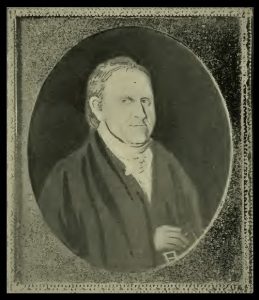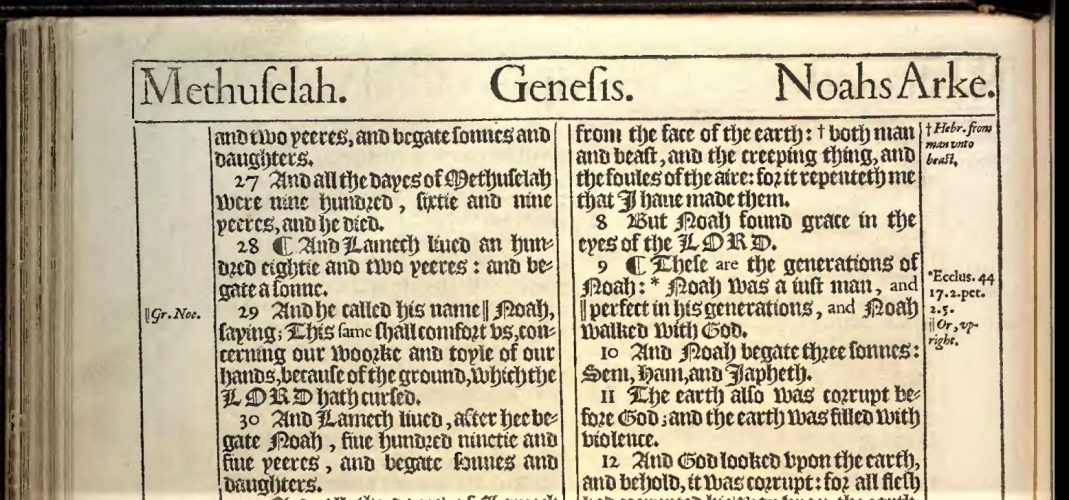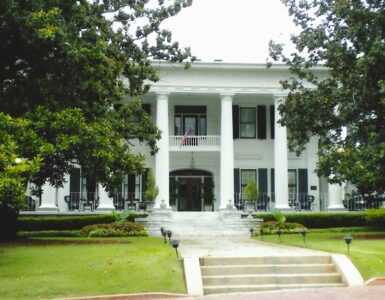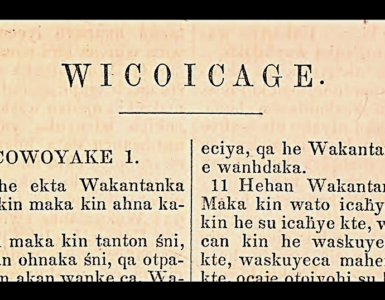 On December 15, 1763 an infant was born the second son of the Baldwins in Newark, New Jersey. While the mother Mehetabel, a biblical name, rocked the sleeping baby she discussed with her husband, Jeremiah, the name of the weeping prophet, the best name for the lad. The one chosen was Methuselah, the father of Lamech and grandfather of Noah (Genesis 5:25-32). It is not a name that would pop into many minds today as a prime selection for a son. Not much more information is available about Methuselah in the Bible other than he was the son of Enoch who “begat sons and daughters” until his life ended at 969 years. Why the parents chose Methuselah for their son’s name is not known, but it is a good name adopted from a man whose fullness continued the seed that would first bring Noah before successive begetters brought the only Begotten.
On December 15, 1763 an infant was born the second son of the Baldwins in Newark, New Jersey. While the mother Mehetabel, a biblical name, rocked the sleeping baby she discussed with her husband, Jeremiah, the name of the weeping prophet, the best name for the lad. The one chosen was Methuselah, the father of Lamech and grandfather of Noah (Genesis 5:25-32). It is not a name that would pop into many minds today as a prime selection for a son. Not much more information is available about Methuselah in the Bible other than he was the son of Enoch who “begat sons and daughters” until his life ended at 969 years. Why the parents chose Methuselah for their son’s name is not known, but it is a good name adopted from a man whose fullness continued the seed that would first bring Noah before successive begetters brought the only Begotten.
Methuselah’s father died when he was only twelve years old leaving Mehetabel struggling to pay the bills and train her children in the way they should go. At the age of about sixteen while attending church during the ministry of a Reverend Chapman, Methuselah professed faith in Christ and shortly thereafter believed he was called to the ministry. But there was a problem, and it was one experienced by other men whose biographies are on Presbyterians of the Past—a lack of funds to pay for an education. The funding issues for divinity students would lead to the Presbyterians establishing, with much motivation for the action coming from John Holt Rice, a fund for “poor and pious youths.” Baldwin convinced the master of an academy in Orange, New Jersey, to let him enter with the promise he would pay as soon as he could. Methuselah must have had a persuasive way about him. He completed preparatory training then entered Queens College (Rutgers) in New Brunswick where he completed the curriculum graduating with the class of 1789 alongside Jonas Coe and eight others.
Ready to study divinity but not yet out of debt for his college expenses, Methuselah taught school in Elizabethtown to pay off what he owed. As he could, he studied theology under the direction of minister Alexander McWhorter. He was licensed to preach by the Presbytery of New York in October 1791, and then for a year was a missionary supplying pulpits in the northern and western regions of New York state. At the close of his mission work he was called to serve the Presbyterian Church of Pleasant Valley in Duchess County, New York. Pleasant Valley is located about eighty miles north of New York City. Methuselah was married in May 1792 to Jane Higgins, then he was ordained and installed pastor of the church November 6. The installation sermon was delivered by John King from Daniel 2:44. Jane died, likely from complications caused by child birth because Methuselah was left with two infant children. After Pleasant Valley he moved to the Presbyterian Church at New Windsor for his next call serving for about four years. He married his second wife, Julianna Evertson during his new call. When the Presbytery of Hudson first convened, November 17, 1795, Methuselah was one of the founding ministers and he was elected the stated clerk. He supplied various vacant churches within the bounds of the presbytery. One of the churches without a pastor was the Scotchtown church which called him to be its minister. He was installed June 30, 1803. The congregation was small and unable to provide adequate financial remuneration, so he purchased a farm for additional income. One member of the church observed that Baldwin was not avaricious, for him it was better to adjust his lifestyle and enjoy the great gain of godliness with contentment (1 Timothy 6:6). Methuselah’s experience growing up poor combined with struggles paying for his education must have taught him God would provide. He lived the remainder of his life with his family on the farm. Currently, Baldwin Hill Road accesses the property that the Baldwins owned. The farm had at least three homes because heating with an open fire led to two houses burning down leaving the Baldwin’s with little. By 1838, Methuselah had limited duties because of his age, so an assistant minister was hired, Edward D. G. Prime. Baldwin’s retirement sermon was delivered by him from 2 Timothy 4:6-8.
For I am now ready to be offered and the time of my departure is at hand. I have fought a good fight. I have finished my course; I have kept the faith; henceforth there is laid up for me a crown of righteousness which the Lord the righteous judge shall give me at that day.
When Methuselah Baldwin died February 27, 1847 he was in his eighty-fourth year and the forty-fourth of his call to the Scotchtown congregation. He had been a minister for over fifty years altogether. For his era, he lived a long life in the spirit of Methuselah of Genesis. He was succeeded by his assistant, E. D. G. Prime, who delivered the memorial sermon from Genesis 49:18.
I have waited for thy Salvation O Lord.
He is buried in the Scotchtown Church cemetery with an obelisk marking the site. He had been a director for the American Tract Society for a number of years. No extant publications could be located in the usual source collections.
Barry Waugh
Notes—The Bible text in the header is from the first edition of the King James Version Bible, 1611. “Passed Three Score & Ten” in the title refers to Psalm 90:10. The Scotchtown Memorial; or, The Centennial of the Presbyterian Church of Scotchtown 1796-1896, Newburgh: E. G. Hulse, 1896, which provided the portrait, and A History of the Presbytery of Hudson, 1681-1888, by Henry Addison Harlow, Middletown: Stivers, Slauson & Boyd, 1888, provided the information for this biography.





